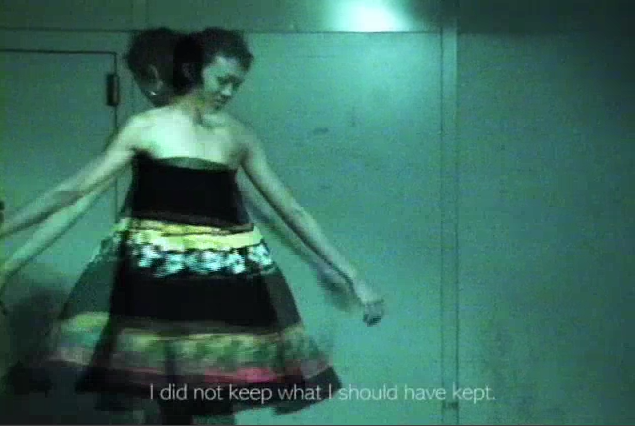

The audience is as important as the speakers in the Sprechstucke, particularly in.Text: Peter Handke (passages from Self-Accusation 1966) In their emphasis on event and process, the rattling of audiences with familiar things-in this case, words-Sprechstucke resemble "Happenings." Where they differ is in the latter's emphasis on a series.of images, and the former's total re!iance on words. The time of the speak-in equals performance time, and the whole experience becomes a group-dynamics session with all its social, psychological and political associations. "You are the event," speakers declare in Offending the Audience. "They need a vis-a-vis, at least oneperson who listens otherwise they would not be natural but extorted by the author," Handke says.1 The audience is not allowed to be passive in Handke's theatre it is not pacified by the illusions of a "fourth wall." Confronted with a nondescript, abstract stage space inwhich a world is created solely by words, the audience witnesses theatre as theatre-the actual making of the work on stage.

The presence of the audience is the sine qua non of the Sprechstucke. The link, therefore, is anthropological-all members of a given society are checked within its linguistic perimeters. From the recognizable language of reality presented by the speakers the spectator can extract the proclamations that pertain to his existence. What Handke has done, in effect, is take the language of an ordered reality and turn it on itself to provide a critique of reality, with the speakers functioning as negative physiognomies on which Handke "writes" the contradictions of human behavior. His is an art of radical juxtaposition-a collage of "found" words which carries on an inner dialogue with the newly created structure of words (speak-in). Like many twentieth century artists, Handke recycles "popular" forms to create a work of radical art.

With these language materials Handke has constructed a kind of literary environmental art in which the dramatic structure demonstrates the regimentation of the individual by his languageconditioned perceptions. A chief component of the speak-ins are "ready-mades" (like the "found" objects in painting and sculpture), material from the language of daily existence: maxims, honorifics, slogans, officialese, advertisements, greetings, etc. Thus, Sprechstucke lack setting, plot, dialogue, and character-all the elements of traditional drama.
Self accusation peter handke full#
The creation of speakers is crucial to the conception of the Sprechstucke because it allows Handke to eliminate from the 52 drama character which is necessarily limited by a linguistic structure (dialogue), and to give full play instead to the presentation of words-infreedom. They are presented by performers who function as "speakers" rather than actors playing roles. Frequently they are simply language games dialogue is entirely absent. Non-representational in their approach, they are completely lacking in stage picturesbut are instead composed of incantatory words. The five speakins he has written (Offending the Audience, Self-Accusation, Prophecy, Callingfor Help, and Quodlibet)are not plays as we are used to defining them but virtually public addresses to an audience. Handke's creation of the Sprechstuck (translated into English as "speak-in") is his original contribution to dramatic form. Yet, it is not without significance that Richard Gilman, one of the few American critics to write on the young Austrian, begins The Making of Modem Drama with a discussion of Georg Buchner and concludes it with a chapter on Peter Handke. Handke is generally unknown to American audiences and students of the drama his plays have baffled and antagonized American critics who, for the most part, have grasped neither the radicalism of his theatre nor its contemporary significance. Several of his works have been produced on the American stage, and all of his plays have been translated into English, though many of his prose and poetry works have not. To date Handke's more than dozen plays and novels, numerous essays and poems, have made him a major figure in the international theatre scene. Six years later he was awarded the prestigious Gerhardt Hauptmann Prize for Drama. THE SPRECHSTUCKE Peter Handke's Universe of Words Bonnie Marranca Peter Handke emerged on the theatre scene in 1966 with the highly controversial Offending the Audience which he wrote at the age of twenty -two. In lieu of an abstract, here is a brief excerpt of the content:


 0 kommentar(er)
0 kommentar(er)
